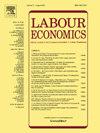法国医院护理人员的供应:外流、兼职和母性
IF 2.6
2区 经济学
Q2 ECONOMICS
引用次数: 0
摘要
本文使用详细的纵向工资税数据与出生证明和人口普查数据相匹配,量化了法国医院在医院护士职业生涯中的护理劳动力供应。在她们职业生涯的头十年里,提供给医院的护理时间平均减少了三分之一以上。这种下降主要是由于医院护士离开这些职位,在较小程度上是由于医院护理工作过渡到兼职安排。离开医院职位的护士主要转向其他工作,通常是在医疗保健部门,而不是失业。这些工作的转变大多与母亲无关,而有了孩子后,母亲们往往会在医院兼职护理工作。事实上,如果没有母性的影响,医院护士中兼职工作的普遍程度将大大降低。最后,虽然医院通过雇用新护士来弥补因意外人员离职而造成的护理时间损失,但他们很难弥补兼职过渡造成的护理时间损失。本文章由计算机程序翻译,如有差异,请以英文原文为准。
The supply of nursing labor in French hospitals: Outflows, part-time work and motherhood
This paper quantifies the supply of nursing labor in French hospitals over the course of hospital nurses’ careers, using detailed longitudinal payroll tax data matched with birth certificates and census data. Over the first ten years of their careers, the nursing hours supplied to hospitals decrease by more than a third on average. This decline is primarily driven by hospital nurses leaving these positions, and to a lesser extent by transitions to part-time schedules within hospital nursing jobs. Nurses who leave hospital positions predominantly transition to other jobs, usually within the healthcare sector, rather than to non-employment. These job transitions are mostly unrelated to motherhood, whereas having children frequently leads mothers to switch to part-time schedules within hospital nursing jobs. In fact, without the effect of motherhood, the prevalence of part-time work among hospital nurses would be significantly lower. Finally, while hospitals offset the loss of nursing hours due to unanticipated staff departures by hiring new nurses, they struggle to compensate for nursing hours lost to part-time transitions.
求助全文
通过发布文献求助,成功后即可免费获取论文全文。
去求助
来源期刊

Labour Economics
ECONOMICS-
CiteScore
3.60
自引率
8.30%
发文量
142
期刊介绍:
Labour Economics is devoted to publishing research in the field of labour economics both on the microeconomic and on the macroeconomic level, in a balanced mix of theory, empirical testing and policy applications. It gives due recognition to analysis and explanation of institutional arrangements of national labour markets and the impact of these institutions on labour market outcomes.
 求助内容:
求助内容: 应助结果提醒方式:
应助结果提醒方式:


